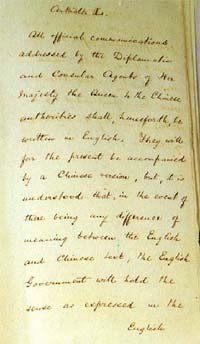ARTICLE 50
CASE 4: China and International Law in the 19th Century
第五十款一、嗣后英国文书俱用英字书写,暂时仍以汉文配送,俟中国选派学生学习英文、英语熟习,即不用配送汉文。自今以后,凡有文词辩论之处,总以英文作为正义。此次定约,汉英文字详细较对无讹,亦照此例
All official communications addressed by the Diplomatic and Consular Agents of Her Majesty the Queen to the Chinese Authorities shall, henceforth, be written in English. They will for the present be accompanied by a Chinese version, but, it is understood that, in the event of there being any difference of meaning between the English and Chinese text, the English Government will hold the sense as expressed in the English text to be the correct sense. This provision is to apply to the Treaty now negotiated, the Chinese text of which has been carefully corrected by the English original.
Since Article 50 is closely followed by Article 51 in the order of British demands, it immediately raises the following few questions:
- What does it mean to imply that the Chinese word yi can be “corrected” by the English word “barbarian?” To understand its implications better, imagine if the French government held the meaning of the English word “alien” to be dependent on the meaning of the French translation.
- Did all parties agree on the translation and on the practice of determining the meaning of a Chinese word according to the meaning of an English word?
- Who was responsible for these translations and negotiations?
To understand how such a remarkable claim came to assume definition in international law, learn the history leading up to this treaty in: HOW IT EVOLVED IN HISTORY.



